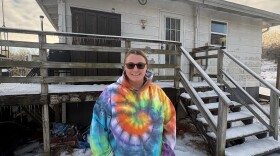Bill Burton: It's time for us to take a look at the Science Behind the Forecast as I am joined by WAVE 3 meteorologist Tawana Andrew. Good morning, Tawana.
Tawana Andrew: Good morning. We're going to talk about bit of a sneezy situation today.
BB: Yeah. It affects you, it affects me, it affects a lot of folks. We're talking about pollen and everything that comes with it. What do we need to know?
TA: Well, a changing climate, of course, has kind of altered our temperatures and precipitation patterns across the country, and that is basically the reason why we now have longer pollen seasons and increased pollen production across the country. And of course, with all of that, that means our allergy symptoms are being triggered earlier in the year, lingering longer and becoming more severe. So...
BB: It's a hat trick!
TA: Yeah, yeah. We're not the only ones, though, struggling in the U.S. Around 60 million people... struggle with pollen annually, and that gives us all the fun symptoms. Sneezing, runny noses, congestion. And according to the CDC, one in four children and one in three adults deals with seasonal allergies. And all of that adds up financially as well, because medical expenses related to pollen allergies exceed $3 billion.
BB: Wait, $3 billion?
TA: That's a lot.
BB: A little bit more than I have in my couch cushions.
TA: I got three cents there, not three billion. But yeah, we're continuing to keep an eye on how everything from severe thunderstorms and flooding and rising temperatures impact things, including reducing indoor air quality and increasing mold growth. Which all of that worsens your respiratory issues, especially if you already have allergies or even more so asthma. And studies now show that the pollen season is three weeks longer than it was five decades ago. So that's almost a month more of more pollen last on top of that, plants are producing approximately 20% more pollen now than they have been in the past three decades as the carbon dioxide levels also go up. If you want to think ahead to your future, according to experts, by the end of the century, pollen emissions could start 40 days earlier in the spring than previous decades.
BB: No, thank you.
TA: So basically, we're going to be starting this in January, the way things are going. And it's not just, you know, the winter side of things. We have to think about fall too, because as temperatures remain warmer into the fall months, and that first frost occurs later, that helps extend to the pollen season. So we're kind of book-ending it a little bit more.
Good news that I have here, though, is that in the 2025 rankings of the most challenging places to live in the U.S. with seasonal allergies, Louisville has dropped in the rankings, yeah, dropped to 69 out of 100.
BB: Well, that's not so bad. I would have thought it would have been higher.
TA: Same. But one of the best things that's been helping us is the fact that the amount of pollen in the Louisville Metro, according to their data, has dropped and also the availability of allergy specialists has gone up. So that's helping us out, but we're still ranked worse than average for the amount of allergy medicine we use, so we're still taking a lot of those allergy pills. And by the way, for anybody trying to plan their day to avoid the most amount of pollen, pollen counts are highest in the morning, so the later you leave your home in the morning, the better off you are.
BB: Well, that's a lot to take in, and least we have a better understanding now of how pollen can affect us and how that pollen season really is getting longer. It's not your imagination, and we know this thanks to this sniffily edition of Science Behind the Forecast with WAVE 3 meteorologist Tawana Andrew. Thanks for the knowledge, Tawana.
TA: Of course, and bless you.
This transcript was edited for clarity






